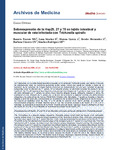
Please use this identifier to cite or link to this item:
http://ricaxcan.uaz.edu.mx/jspui/handle/20.500.11845/825| Title: | Sobreexpresión de la Hsp25, 27 y 70 en tejido intestinal y muscular de rata infectada con Trichinella spiralis |
| Authors: | Basurto Frausto, María Guadalupe Luna Sánchez, B Moreno García, María Alejandra Reveles Hernández, Rosa Gabriela Barbosa Cisneros, Olga Yadira Sánchez Rodríguez, Sergio |
| Issue Date: | Jan-2008 |
| Publisher: | iMedPub LTD |
| Abstract: | La Triquinelosis es una enfermedad parasitaria causada por el nematodo Trichinella spiralis, que infecta el músculo de prácticamente todos los mamíferos generando estrés celular, mismo que puede ser medido a través de la expresión de las proteínas de choque calórico (Hsp) que se sobreexpresan por una gran variedad de agentes estresantes como la infección por T. spiralis. En el presente estudio, se determinó el grado de expresión de las Hsp25, 27, 60, 70 y 90 durante la fase intestinal y muscular del ciclo biológico de T. spiralis en ratas Long Evans. De las ratas infectadas con T. spiralis, se obtuvo suero, intestino delgado, lengua, diafragma, masetero y pierna. Se caracterizó el ciclo biológico de T. spiralis por la técnica de compresión y digestión artificial, los determinantes antigénicos y la expresión de las Hsp por PAGE-SDS y Western blot. Resultados: T. spiralis se implanta en intestino delgado a partir del sexto día, correlacionado con la detección de los determinantes antigénicos al mismo tiempo, y en músculo se establece entre los días 15 y 16, donde se observa en el mismo periodo, un aumento del reconocimiento antigénico. El tejido intestinal sano en sus tres porciones expresa a las Hsp25, 27 y 70 y en el infectado se incrementa la expresión de la Hsp70. El tejido sano de pierna, masetero, lengua y diafragma, expresa las Hsp25, 60, 70 y 90, y en el infectado se incrementa la expresión de las Hsp25 y 70. |
| Description: | The Trichinellosis is a parasitic disease caused by Trichinella spiralis, which infect the muscle of all mammalian causing cellular stress, it is measured trough expression of the Heat shock proteins (Hsp), which are overexpressed by many stress agents such as T. spiralis infection. In this study we determined the expression of the Hsp25, 27, 60, 70 and 90 during the intestinal and muscular stage of the biological cycle of T. spiralis in Long Evans rats. From the infected rats with T. spiralis, we obtain serum, thin intestine, tongue, diaphragm, masseter and leg. We characterized the biological cycle of T. spiralis by compression and artificial digestion technique, the antigenic determinants and the expression of Hsp by PAGE-SDS and Western blot. Results: We found that T. spiralis is implanted in the thin intestine at the sixth day, which is correlated with the detection of antigenic determinants at the same time, and in the muscle tissue is present between the 15 and 16 days, were observed in the same period, an increased of antigen recognition. The healthy intestinal tissue, in his three portions, express the Hsp25, 27 and 70 and in the infected tissue is increased the expression of Hsp70. The healthy tissue of tongue, diaphragm, masseter and leg, express Hsp25, 60, 70 and 90, and the infect tissue increases the expression of Hsp25 and 70. |
| URI: | http://localhost/xmlui/handle/20.500.11845/825 https://doi.org/10.48779/9sdr-3e66 |
| ISSN: | 1698-9465 |
| Other Identifiers: | info:eu-repo/semantics/publishedVersion |
| Appears in Collections: | *Documentos Académicos*-- UA Ciencias Biológicas |
Files in This Item:
| File | Description | Size | Format | |
|---|---|---|---|---|
| DeLaHsp2527Y70EnTejidoIntestinalYMus-2591761.pdf | 490,28 kB | Adobe PDF |  View/Open |
This item is licensed under a Creative Commons License
